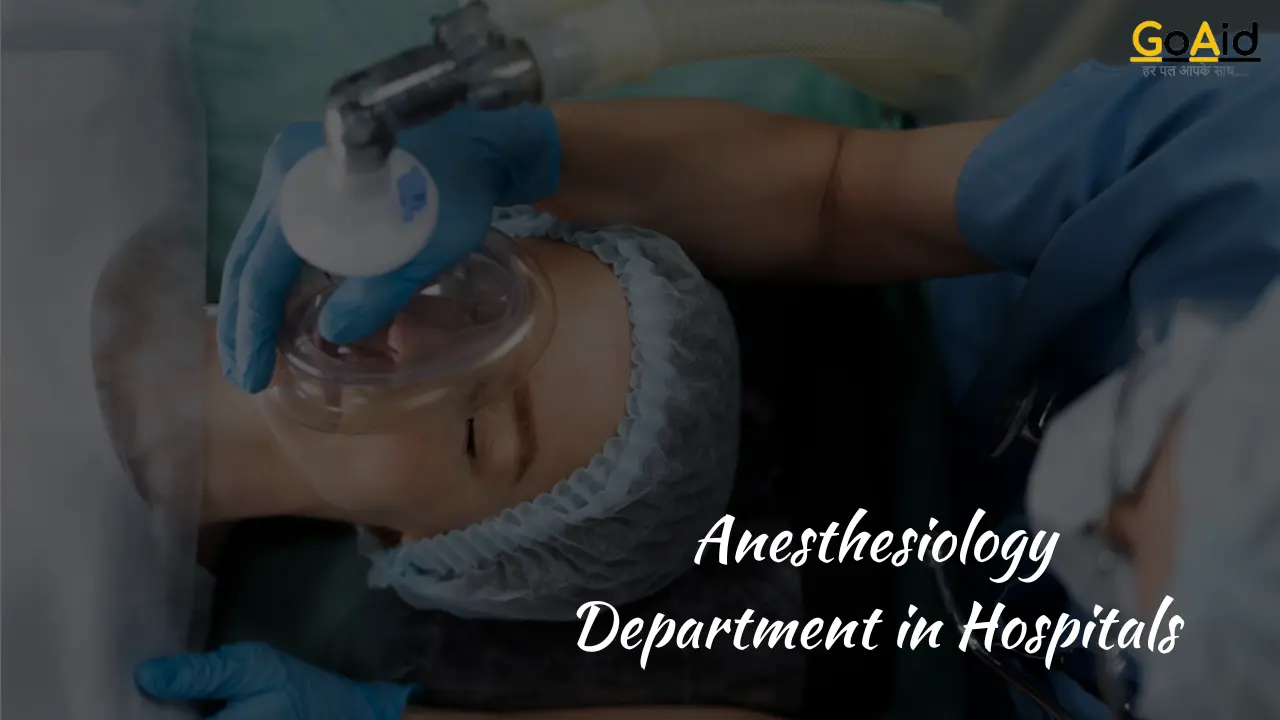If you need a good Anesthesiology Hospital that Manages anesthesia during surgeries and pain control, then you must look for the top anesthesiology department in hospitals. The medical terminology of these types of departments sometimes gets a bit confusing and hard to understand, and this is why many of us donŌĆÖt even know about what is the Anesthesiology Department in Hospitals.
This is why, in this blog, we have added a comprehensive detail about the Anesthesiology Department in Hospitals. Not only that, we have explained every component of the Anesthesiology Department in Hospitals such as the meaning of the Anesthesiology, roles, and responsibilities of this department, features, and specialties of this department, treatment a patient may get in this department, key equipment used in this department; Also, how to choose the best Anesthesiology Department in Hospital in India. If you are also excited to know all these details about Anesthesiology Department in Hospitals then read this blog to the end.
So, letŌĆÖs start:
Complete Guide to the Anesthesiology Department in Hospital
We have added all the details related to the Anesthesiology Department in Hospitals in this blog mentioning and explaining every component of the Anesthesiology Department in Hospitals in India in this blog below.
What is the Anesthesiology Department in the Hospital? ŌĆō What does Anesthesiology mean?
The Anesthesiology Department is responsible for administering anesthesia during surgical procedures and managing pain relief for patients. Anesthesiology, derived from the Greek “an-” (without) and “aesthesis” (sensation), encompasses techniques that induce a state of controlled unconsciousness or sedation.
In hospitals, anesthesiologists assess patients pre-operatively to determine the appropriate anesthesia plan based on individual health profiles. They monitor vital signs throughout surgery to ensure patient safety and comfort. Post-operative care includes managing pain through various modalities such as nerve blocks or intravenous medications. The function of the Anesthesiology department is critical in enhancing surgical outcomes while minimizing discomfort.
Roles and Responsibilities in Anesthesiology Department in Hospitals
The Anesthesiology Department is essential for ensuring patient safety and comfort during surgical procedures. Anesthesiologists manage anesthesia care before, during, and after surgery, playing a vital role in patient outcomes.
1. Preoperative Evaluation
Anesthesiologists conduct thorough preoperative evaluations to assess patient health, review medical histories, and determine anesthesia plans tailored to individual needs before any surgical procedure.
2. Anesthetic Administration
During surgery, anesthesiologists administer anesthesia, ensuring patients are safely sedated or completely unconscious while continuously monitoring vital signs for any changes throughout the procedure.
3. Monitoring Vital Signs
Anesthesiologists are responsible for closely monitoring patients’ vital functions such as heart rate, blood pressure, and oxygen levels during surgery, ensuring optimal conditions for surgical success.
4. Postoperative Care
After surgery, anesthesiologists oversee recovery in the Post Anesthesia Care Unit (PACU), managing pain control and monitoring patients as they awaken from anesthesia to ensure safe recovery.
5. Pain Management
They specialize in pain management strategies for both acute and chronic pain conditions, providing effective solutions for patients experiencing discomfort post-surgery or due to other medical issues.
6. Emergency Response
Anesthesiologists are trained to respond to emergencies during surgery, addressing complications such as respiratory distress or cardiovascular instability promptly to safeguard patient health.
7. Collaboration with Surgical Teams
They work closely with surgeons and other healthcare professionals to coordinate care before, during, and after procedures, ensuring comprehensive management of patient needs.
8. Education and Training
Anesthesiologists play a crucial role in educating patients about anesthesia risks and benefits while also training medical staff on anesthesia protocols and safety measures.
9. Research Participation
Many anesthesiologists engage in clinical research aimed at improving anesthesia techniques and patient outcomes, contributing to advancements in the field of anesthesiology.
10. Quality Assurance
They are involved in quality assurance initiatives within the department to enhance patient safety protocols and ensure adherence to best practices in anesthesia care.
Features and Specialities of the Anesthesiology Department
The Anesthesiology Department is crucial for ensuring patient safety during surgical procedures by managing anesthesia care effectively. This department specializes in pain management before, during, and after surgery.
1. Comprehensive Preoperative Assessments
Anesthesiologists conduct thorough preoperative evaluations to assess patient health status, medical history, and anesthesia risks before any surgical intervention takes place for optimal safety outcomes.
2. Administration of Anesthesia
During surgeries, anesthesiologists expertly administer various types of anesthesiaŌĆögeneral or regionalŌĆöensuring patients remain comfortable while monitoring vital signs continuously throughout the procedure.
3. Postoperative Care Management
After surgery, anesthesiologists oversee recovery in the Post Anesthesia Care Unit (PACU), managing pain control strategies while monitoring patients as they awaken safely from anesthesia effects.
Also Read: Importance of Health, Benefits, Types, Maintain & Factors
4. Pain Management Expertise
The department specializes in pain management techniques beyond surgery, anesthesiologists provide interventions such as nerve blocks or epidurals tailored specifically to individual patient needs for chronic pain relief.
5. Emergency Response Training
Anesthesiologists are trained to respond rapidly during surgical emergencies by implementing resuscitation protocols effectively if complications arise related to anesthesia administration or patient stability.
6. Collaboration with Surgical Teams
Anesthesiology departments work closely with surgeons and other healthcare professionals to ensure comprehensive perioperative care that addresses all aspects of patient safety during surgical procedures.
7. Patient Education on Anesthesia Risks
Educating patients about anesthesia risks, benefits, and what to expect during their surgical experience is a key responsibility within the anesthesiology department aimed at alleviating anxiety preoperatively.
8. Research Initiatives in Anesthesia Techniques
Many anesthesiologists engage actively in research focused on improving anesthesia techniques while exploring innovative approaches that enhance patient safety throughout surgical procedures effectively.
Know More: Endocrinology Department in Hospitals
9. Quality Assurance Programs
Anesthesiology departments implement rigorous quality assurance programs designed to monitor anesthesia practices continuously while ensuring compliance with established safety protocols within hospital settings.
10. Fellowship Training Opportunities
The department offers fellowship training opportunities for physicians seeking advanced expertise in specialized areas such as pediatric anesthesia or pain management further enhancing overall departmental capabilities.
What treatment is provided in the Anesthesiology Department?
The Anesthesiology department in hospitals is vital for managing pain and ensuring patient safety during surgeries and medical interventions. It uses advanced techniques and equipment to address a variety of conditions requiring pain relief and sedation.
1. Chronic Pain
Chronic pain is long-lasting discomfort caused by nerve damage, arthritis, or other underlying conditions, significantly affecting the quality of life. The Anesthesiology department specializes in managing this pain through advanced interventions.
- Administering nerve blocks for localized pain relief
- Using spinal cord stimulation for severe nerve pain
- Prescribing medications like opioids and NSAIDs
- Providing radiofrequency ablation for nerve desensitization
- Regular follow-ups in the hospital Anesthesiology room
2. Surgical Pain
Surgical pain arises during or after operations and requires precise management to ensure patient comfort and recovery. It is a primary focus of Anesthesiology services in hospital environments.
- Administering general, regional, or local anesthesia
- Using patient-controlled analgesia (PCA) devices for self-regulated relief
- Providing epidural analgesia for postoperative care
- Conducting nerve blocks to target specific areas
- Monitoring in the Anesthesiology ward post-surgery
Also Read: Dermatology Department in Hospitals
3. Labor Pain
Labor pain occurs during childbirth due to uterine contractions and cervical dilation. The Anesthesiology department in hospitals plays a critical role in easing this pain for mothers.
- Administering epidural or spinal anesthesia during delivery
- Offering nitrous oxide as a mild sedative
- Providing continuous pain monitoring during labor
- Performing caudal blocks for focused pain relief
- Assisting with cesarean anesthesia
4. Cancer Pain
Cancer pain results from tumor growth, treatment side effects, or nerve compression. It requires a specialized approach from the Department of Anesthesiology to ensure relief.
- Performing nerve blocks or neurolytic procedures
- Administering opioid and non-opioid analgesics
- Offering palliative sedation in advanced cases
- Using infusion pumps for continuous medication delivery
- Supporting patients in hospital Anesthesiology rooms
5. Trauma-Related Pain
Severe pain caused by injuries such as fractures, burns, or surgeries after accidents is managed by the Anesthesiology department.
- Administering regional anesthesia for localized injuries
- Using sedation for invasive procedures
- Providing multimodal pain management therapies
- Monitoring patient progress in recovery rooms
- Coordinating care with trauma teams
6. Headaches and Migraines
Chronic headaches and migraines can be debilitating and are often referred to the Anesthesiology department for advanced pain relief methods.
- Conducting occipital nerve blocks
- Offering Botox injections for chronic migraines
- Prescribing medications targeting vascular triggers
- Using radiofrequency ablation for nerve pain
- Monitoring improvement over time
Read More: Top 10 Neurology Hospitals in Jaipur
7. Neuropathic Pain
Neuropathic pain occurs due to nerve damage from conditions like diabetes or spinal injuries. The Anesthesiology ward in hospitals provides specialized care.
- Performing nerve blocks or ablation procedures
- Administering medications like gabapentin
- Providing physical therapy recommendations
- Using spinal cord stimulators
- Monitoring through advanced imaging and equipment
8. Postoperative Pain
Postoperative pain follows surgical procedures and can hinder recovery if unmanaged. The function of the Anesthesiology department in hospital settings is crucial here.
- Using epidural or intravenous pain management techniques
- Administering PCA devices for self-regulated relief
- Providing multimodal pain relief options
- Educating patients on pain management plans
- Ensuring constant monitoring in recovery areas
9. Back and Joint Pain
Chronic back or joint pain caused by arthritis, injuries, or spinal conditions is commonly treated by the Anesthesiology department.
- Administering facet joint or epidural steroid injections
- Using nerve ablation techniques for relief
- Offering medication-assisted therapies
- Providing physical therapy guidance
- Monitoring progress in outpatient settings
10. Pediatric Pain Management
Pain in children, whether from injury, surgery, or chronic illness, requires delicate care by the Department of Anesthesiology.
- Administering age-appropriate sedation and analgesia
- Using nerve blocks for targeted pain relief
- Monitoring vitals in pediatric recovery wards
- Coordinating with family and pediatricians
- Offering distraction techniques alongside medications
Know More: Gastroenterology Department in Hospitals
Essential Equipment used in the Anesthesiology Department
The Anesthesiology department in hospitals is equipped with advanced tools to administer anesthesia safely, monitor patients during surgeries, and manage pain. Below are the essential equipment in Anesthesiology wards with their detailed descriptions:
1. Anesthesia Machine
An anesthesia machine delivers controlled amounts of anesthetic gases and oxygen to patients during surgeries.
- Ensures continuous monitoring of oxygen delivery.
- Includes vaporizer to administer precise anesthetic doses.
- Essential for managing respiratory function during procedures.
2. Patient Monitoring Systems
These devices monitor vital parameters like heart rate, oxygen saturation, and blood pressure during anesthesia.
- Tracks change in cardiac rhythm in real-time
- Ensures patient safety with continuous monitoring.
- Alerts anesthesiologists to any abnormalities during surgeries.
3. Laryngoscope
A laryngoscope is used for visualizing and accessing the vocal cords during intubation.
- Assists in placing the endotracheal tube accurately.
- Helps manage the airway in critical and emergency cases.
- Essential for ensuring unobstructed breathing during anesthesia.
Also Read: Top 10 Ambulance Service in Bangalore
4. Endotracheal Tubes (ETTs)
ETTs are flexible tubes inserted into the trachea to maintain an open airway during surgeries.
- Ensures proper ventilation under anesthesia.
- Prevents aspiration of fluids into the lungs.
- Facilitates mechanical ventilation for longer procedures.
5. Syringe Infusion Pumps
These pumps deliver precise amounts of medications or anesthetics over time.
- Controls the administration of sedatives and analgesics.
- Ensures consistent drug delivery during long surgeries.
- Reduces the risk of over- or under-dosing.
6. Suction Apparatus
A suction apparatus clears blood, mucus, or secretions from the airway.
- Maintains a clear airway during and after surgery.
- Supports emergency airway management.
- Ensures patient safety by preventing obstructions.
7. Peripheral Nerve Stimulators
These devices test nerve responses to monitor the depth of neuromuscular blockade.
- Helps in assessing the effectiveness of muscle relaxants.
- Ensures the patient remains immobile during surgeries.
- Aids in safe recovery from anesthesia by reversing neuromuscular blocking agents.
8. Blood Gas Analyzer
This device measures arterial blood gases, including oxygen, carbon dioxide, and pH levels.
- Monitors respiratory and metabolic status during anesthesia.
- Helps adjust ventilator settings based on patient needs.
- Provides critical data for managing acutely ill patients.
Also Read: Top 10 Government & Private Hospitals in Bangalore
9. Video Laryngoscope
An advanced version of the laryngoscope with a camera to visualize the airway.
- Improves accuracy in difficult airway intubations.
- Reduces complications in airway management.
- Used in teaching and training anesthesiology professionals.
10. Mechanical Ventilator
A ventilator provides respiratory support to patients under anesthesia or in critical care.
- Delivers precise oxygen volumes and pressures.
- Maintains respiratory function during long surgeries.
- Essential in the hospital Anesthesiology room for managing post-operative patients.
How to Choose the Best Anesthesiology Hospital in India?
Selecting the right hospital for anesthesiology services is crucial for ensuring patient safety and comfort during surgical procedures. Factors such as expertise, technology, and patient care services significantly influence the quality of anesthetic care provided.
1. Research Hospital Reputation
Investigate the hospital’s reputation in providing anesthesiology services. Look for hospitals recognized for their Anesthesiology Services in Hospital, focusing on patient reviews and success rates in pain management and anesthesia administration.
Know More: Top 10 Neurologists in Jaipur
- Check online reviews and testimonials from previous patients.
- Consult with healthcare professionals for recommendations.
- Evaluate the hospital’s accreditation and recognition in anesthesiology.
2. Evaluate Medical Expertise
Ensure that the hospital has qualified anesthesiologists specializing in various anesthesia techniques and pain management. The expertise of the medical team is vital for effective anesthesia delivery during procedures.
- Look for board-certified anesthesiologists with extensive experience.
- Assess the qualifications and training of the healthcare providers.
- Consider hospitals with a multidisciplinary approach to surgical care.
3. Assess Available Anesthesia Techniques
Review the range of anesthesia techniques offered by the hospitalŌĆÖs Anesthesiology department. Comprehensive options, including general, regional, and local anesthesia, are essential for managing different surgical needs effectively.
- Inquire about advanced anesthesia modalities available at the facility.
- Ensure access to specialized services like pain management and sedation.
- Evaluate the hospital’s capability to provide personalized anesthesia plans.
4. Check Monitoring Facilities
A well-equipped hospital with advanced monitoring tools is crucial for ensuring patient safety during anesthesia administration. Look for facilities that utilize state-of-the-art equipment for vital sign monitoring.
- Ensure the availability of continuous cardiac and respiratory monitoring systems.
- Confirm access to advanced technology for real-time data tracking during surgery.
- Assess protocols in place for emergency response during procedures.
5. Review Patient Care Services
Consider hospitals that prioritize patient care and support services throughout the surgical process. A supportive environment enhances recovery and overall patient experience during anesthesia administration.
- Inquire about preoperative counseling services to address patient concerns.
- Evaluate postoperative care protocols focused on pain management.
- Check if the hospital offers rehabilitation programs post-surgery.
Also Read: Top 10 Heart Hospital in Jaipur
6. Location and Accessibility
Choose a hospital that is conveniently located, making it easier for you to attend appointments and surgeries regularly. Accessibility can significantly impact your treatment journey.
- Consider proximity to your home or workplace.
- Evaluate transportation options available to reach the hospital.
- Check parking facilities if you plan to drive.
7. Insurance Coverage
Verify whether the hospital accepts your health insurance plan or offers financing options to manage treatment costs effectively. Understanding financial aspects is crucial before committing to a facility.
- Inquire about payment plans or financial assistance programs.
- Confirm coverage details with your insurance provider regarding anesthesia services.
- Assess out-of-pocket expenses based on your insurance policy.
8. Patient Education Programs
Look for hospitals that provide educational resources about anesthesia procedures, including potential risks, benefits, and recovery expectations. Knowledge empowers patients to make informed decisions about their care.
- Check if they offer workshops or informational sessions on anesthesia.
- Inquire about materials available for patients and families regarding anesthesia processes.
- Ensure access to resources that promote understanding of Anesthesiology meaning.
Know More: The Challenges of Rural Ambulance Services in India
9. Follow-up Care Services
Evaluate the availability of follow-up care services after surgery completion. Continuous monitoring is essential for managing potential complications associated with anesthesia administration.
- Inquire about regular check-ups and monitoring protocols post-surgery.
- Assess support services available for long-term recovery management.
- Ensure access to specialists for ongoing evaluation of anesthesia effects.
10. Patient-Centric Approach
Choose a hospital that emphasizes a patient-centric approach, ensuring that your preferences and needs are prioritized throughout your surgical journey in the hospital’s Anesthesiology room.
- Look for facilities that encourage patient involvement in decision-making regarding anesthesia options.
- Evaluate how well staff communicate with patients regarding their conditions and treatments.
- Confirm that your comfort and preferences are respected during all phases of care.
Book Ambulance: GoAid Ambulance Service
Conclusion to the Anesthesiology Department Hospitals
In conclusion, the Anesthesiology department is a cornerstone of modern healthcare, ensuring patient safety and comfort during surgeries and medical procedures. Understanding the Anesthesiology definition, this specialty focuses on pain management, sedation, and life-support functions during critical interventions. The department of Anesthesiology in hospitals is equipped with cutting-edge technology and essential equipment in the Anesthesiology ward to deliver precision care through advanced techniques.
The function of the Anesthesiology department in hospitals extends beyond surgeries, including critical care and pain management services. Highly skilled professionals ensure the success of procedures while addressing patient concerns. The importance of the Anesthesiology department lies in its pivotal role in maintaining patient stability and comfort. We have provided comprehensive details about this department. If you have any additional questions related to this blog, feel free to share them in the comment box below.
















